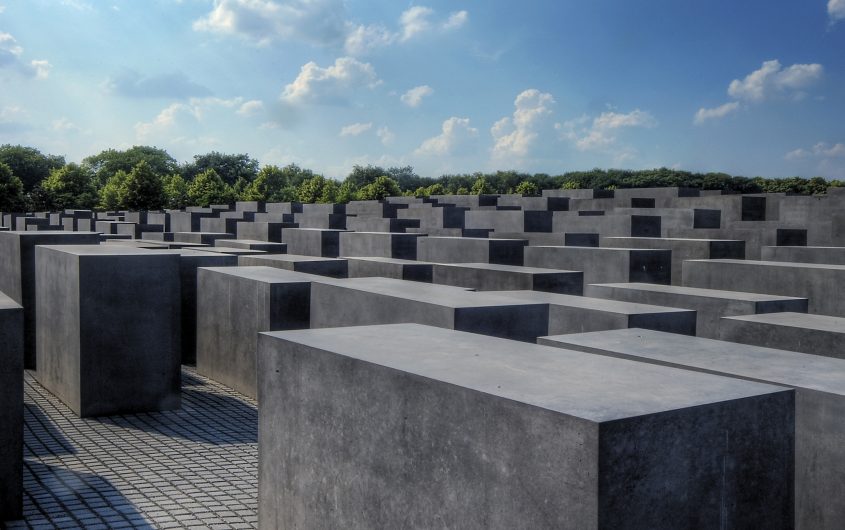
Wolfgang Staudt via Flickr
On the Possibilities and Pitfalls of German Holocaust Memory Today
Michael Rothberg
University of California, Los Angeles
Michael Rothberg is the 1939 Society Samuel Goetz Chair in Holocaust Studies and Professor of English and Comparative Literature at the University of California, Los Angeles. He is the author of The Implicated Subject: Beyond Victims and Perpetrators, Multidirectional Memory: Remembering the Holocaust in the Age of Decolonization and Traumatic Realism: The Demands of Holocaust Representation. The German translation of Multidirectional Memory in 2021 sparked a national debate about the relation between the Holocaust and colonialism.
In the past week, we marked the eightieth anniversary of the Wannsee Conference, in which Nazi bureaucrats coordinated the murder of millions of European Jews in a beautiful villa outside Berlin, and the seventy-seventh anniversary of the liberation of Auschwitz, the largest of the Nazi killing centers. With each anniversary, the number of eyewitnesses of the events of the Second World War and Holocaust gets smaller. Such anniversaries are not only occasions for remembering, but occasions for reflecting on how and why we remember. Such reflection is especially urgent in today’s Germany, as it is in many other societies around the world.
Among those lost this year was Esther Bejarano (née Loewy), a German Jewish musician, activist, and survivor of Auschwitz and Ravensbrück, who died on July 10 in Hamburg at the age of 96. Right up until the end, Bejarano fought to keep the memory of the Nazi genocide alive by offering resistance to what she saw as its afterlives in the present. As recently as May, just a few months before her death, she delivered a speech from a wheelchair, swaddled in a winter coat, as part of the campaign to recognize May 8 as a national holiday marking liberation from National Socialism. Most remarkably, in the last decade of her life, Bejarano—who said she owed her survival of Auschwitz to the fact that she was selected for the Nazi-created “Women’s Orchestra” in Birkenau—performed hundreds of times with the migrant hip-hip group Microphone Mafia. The repertoire of Bejarano and Microphone Mafia included songs such as “Sag Nicht Keinmal,” the partisan anthem written in the Vilna Ghetto by Hirsch Glick, and the leftist classic “Bella Ciao”—all of which they performed in multilingual versions that combined Yiddish, Hebrew, Turkish, German, and Neapolitan dialect and juxtaposed rap with traditional Jewish melodies. Appearing at schools, festivals, and commemorative ceremonies under the banner (literally and figuratively) of anti-fascism, Bejarano and Microphone Mafia simultaneously kept the memory of the Holocaust alive among Germans of different generations and drew attention to contemporary concerns, including the persistence of far-right movements, ongoing racist violence against both Jews and people of color, and the plight of refugees and migrants.
With her explicitly politicized practice of remembrance, Bejarano was clearly not a typical Holocaust survivor. Yet, her life and her death provide a powerful starting point for thinking about the status of Holocaust memory in Germany in the third decade of the twenty-first century. In particular, Bejarano’s example sharpens the central question facing Germany today: how to think about the relation between the Nazi past and the postmigrant present at a moment of generational transition. If Bejarano’s antifascist politics could sometimes seem crude or anachronistic, she was not wrong about the threat of far-right forces in the present. In recent years, numerous scandals have exposed the relativizing tendencies of the Alternative for Germany party (AfD) with regards to German responsibility for the Holocaust; meanwhile, COVID-deniers and anti-vaxxers have perversely appropriated the suffering of Holocaust victims by donning yellow stars and equating public health officials with Nazi doctors.
There are some signs that German memory culture is beginning to accommodate a greater range of historical memories and to begin to take meaningful responsibility for them, even if this process remains incomplete.
Beyond the disappearance of the survivor generation, embodied with such vivacity until the end by Bejarano, and the perversities of the far-right and conspiratorial fringe, other problems lurk in contemporary memory culture; indeed, a malaise grips the center of Holocaust commemoration in Germany. The past few years have seen virulent controversies about the singularity of the Holocaust and its relation to other histories of violence, not least that of German colonialism. In the famous Historikerstreit of 1986, left-liberals led by philosopher Jürgen Habermas defended the singularity of the Holocaust and of German responsibility for it from politically-interested attempts at relativization on the part of conservative historians like Ernst Nolte. Today, in contrast, comparative approaches to the Nazi genocide and its memory come from scholars on the left (including the author of this essay).
Challenges to the hard-won Holocaust memory regime that followed from the Historikerstreit and came to define post-unification Germany lead many liberals to worry about the erosion of the Federal Republic’s defining values. Yet, today’s challenges from the left differ fundamentally from those of the 1980s conservatives. Nolte made an explicitly exculpatory—and unconvincing—argument about the “reactive” nature of the Nazi genocide: it was, he claimed, both an imitation of Soviet crimes in the Gulag and an attempt to protect Germans from suffering a similar fate. In contextualizing the Holocaust in global and colonial history, scholars such as Dirk Moses and Jürgen Zimmerer are not seeking to detract from German responsibility for the Nazi past, but to situate it in a larger context of imperial violence and to direct attention to Germany’s additional responsibility for the genocide of the Herero and Nama among other colonial atrocities. My own work—although frequently misunderstood in the German context—has attempted to show that the commemoration of one event need not exclude that of others. There is in fact a long, “multidirectional” tradition of remembering the Holocaust alongside transatlantic slavery and European colonialism. While such comparative memory cultures can sometimes elide differences between distinct histories, they also have the capacity to forge what I have called “differential solidarity,” inspired by the African American intellectual W.E.B. Du Bois’s 1952 article “The Negro and the Warsaw Ghetto,” among other examples of multidirectional memory. Comparison and connection do not require equation and erasure.
Despite the aggressive rejection of comparative history and multidirectional memory by influential journalists and historians, there are some signs that German memory culture is beginning to accommodate a greater range of historical memories and to begin to take meaningful responsibility for them, even if this process remains incomplete. Examples such as official recognition of the Herero and Nama Genocide and the renaming of some city streets that commemorate colonial officials are positive trends. As Habermas himself wrote in response to the recent controversies about singularity and comparison, a nation’s memory culture cannot be allowed to “freeze over.”
Against the dogmatic turn in Holocaust memory, which gives rise to the weaponization of antisemitism and the policing of the boundaries of legitimate critique of Israeli policy, we can hold up Esther Bejarano’s legacy: an antifascist legacy that draws inspiration from the past to fight racism and injustice in the present.
Yet, despite these signs of a thaw, other indications are less promising. Not only does an enormous amount of work remain to be done to create a culture of Vergangenheitsaufarbeitung (working through the past) in the realm of colonial history. Just as drastic is the need for a new conversation about antisemitism and its weaponization. The insistence on the singularity of the Holocaust has brought with it a much more questionable insistence on the sui generis nature of antisemitism, which in Germany is resolutely separated from other forms of racism. When brought into proximity with the ongoing crisis in Israel/Palestine, accusations of antisemitism become instruments of illiberal governance that enable the disciplining of those who express solidarity with the Palestinian cause, oppose the heavy-handed treatment of those who do, or simply get caught up in a process of guilt-by-association (Kontaktschuld). Such an illiberal turn achieved official imprimatur with the 2019 Bundestag resolution condemning the non-violent, Palestinian-led Boycott, Divestment, and Sanctions movement (BDS) as intrinsically antisemitic. In its wake, dubious campaigns have been waged against prominent scholars of color such as Achille Mbembe, Jewish studies scholars such as Peter Schäfer of the Jewish Museum Berlin, progressive intellectuals such as Carolin Emcke, Palestinian-German journalists such as Nemi El-Hassan, and, increasingly, Jewish individuals and groups who challenge mainstream German common sense on Israel.
Indeed, even Holocaust survivors have been subjected to these aggressive campaigns. A few months before her death, an “anti-Deutsch” Twitter account targeted Esther Bejarano, who had not only survived Auschwitz but also spent fifteen years living in Israel, by declaring it “UNBEARABLE that in post-Nazi Germany an anti-Zionist is honorary president of the VVN-BdA [the Association of the Persecuted of the Nazi Regime—Bund of Antifascists].” This attack on Bejarano, like the ones that continue against a host of German and non-German participants in the German public sphere, represents the dark side of Germany’s much-lauded Holocaust memory culture.
Against the dogmatic turn in Holocaust memory, which gives rise to the weaponization of antisemitism and the policing of the boundaries of legitimate critique of Israeli policy, we can hold up Esther Bejarano’s legacy: an antifascist legacy that draws inspiration from the past to fight racism and injustice in the present. Although the loss of Bejarano and the many other survivors who have passed away in recent years is a real one with significant consequences for the transmission of Holocaust memory in the future, Bejarano lives on in the work of her bandmembers from Microphone Mafia—musicians and activists who continue to recall the past while confronting more recent acts of far-right violence in Halle, Hanau, and beyond.








